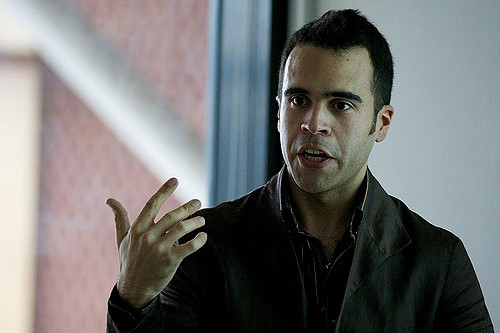Polis Intern and LSE MSc student Wei He reports on the latest Polis Media Agenda Talk featuring Zaki Cooper, Group Public Affairs at Standard Chartered Bank
“It takes many good deeds to build a reputation and only one bad one to lose it.”
While Benjamin Franklin cannot stress more the importance of fame, his sentiments were echoed by Warren Buffet, who could stand “losing money by bad decisions” but would act “ruthless” for losing company reputation.
Perhaps in this time of intense scrutiny, one great concern for CEOs is how to increase public and investor confidence in the company and enhance self-image.
As technological leaps help accelerate the commodification of media and communications, public relations have come on to the radar of mainstream media.
While many cast PR as a profession of “spinners” seeking to foist “propaganda” that are at odds with authenticity and transparency, Zaki Cooper, a veteran communications officer who works in Group Public Affairs at Standard Chartered Bank, believed it to be critical to the corporate image and even share prices.
Having worked in the Buckingham Palace press office with a focus on the Diamond Jubilee ceremony, Cooper is well positioned to summarize the overarching goal for public relations as “promoting and protecting images”, and forming sound relationships for “effective communication”.
There are many players that companies deal with on a daily basis: investors, trade groups, government organs, consumers, etc. But it’s a bit premature to overdo all the marketing while neglecting a traditionally savvy media relationship. After all, media is still a high watermark for public relations.
Having worked as a business reporter in China for four years, I got in touch with many corporate communication officers who chased me for question lists in the hope that they hand in a fully-prepared answer sheet to their CEOs. But more often than not, reporters come up with ad-hoc follow-up questions that do not fall in the terrain of any of those prepared. That’s what distresses them the most.
It’s not at all surprising that many CEOs can articulate sophisticated capital acquisitions but fail to deliver the right message in front of the media. Just as Cooper put it, ” Not all great leaders are great orators”.
He offers a string of winning recipes as communication commandments: be clear about the message, identify target audience, stay repetitive and consistent, apologize for mistakes, etc.
To be frank, the most effective recipe is perhaps to think like a reporter and identify the fact that “news” and “promptness” are always their desire. Hence the job would become understanding your business in a way that you can communicate news to the media.
For instance, it helped restore investors confidence when Shell China CEO Huibert Vigeveno reaffirmed in the interview the continued commitment of shale gas exploration in Sichuan Basin, especially amid concerns that concerns that oil majors in the United States are spinning off shale assets after struggling to profit from the prolific sector and that a similar retreat might occur in China.
Never say “no comment” as if you are avoiding an issue. It is a test of wisdom for the PR team to come up with something that quench the thirst of reporters while circumvent disclosure restrictions for listed firms.
And always act in a positive manner in the face of a crisis. When certain batches of Lipton teabags were found to contain tainted chemicals in China, Unilever China’s PR team took a proactive stance. Not only have they sent out announcements and answered media inquiries in a timely fashion, they conducted a Q-A online on the official micro blog to dispel customer concerns. To this day, the Lipton Tea bags have always been a favourite for China’s white collar workers.
China’s Internet giant Alibaba Group is revolutionizing the communicative mechanism with the media by positioning itself as a “trend setter”. Leveraging on its big data that tracks online consumer behaviours on Alibaba’s two virtual shopping venues, Alibaba releases various consumer reports on a weekly basis that many media regards it as a “must-have”. Besides, it runs a company news site that applies journalistic standards and practices to coverage of company news and the e-commerce industry as a whole. This seemingly balanced, all inclusive reports that may occasionally casts Alibaba Group in an unfavourable light, would in turn encourage more media to quote, without realizing it is in essence a huge marketing campaign for the company.
Finally, you don’t necessarily have to act proactive to deliver the right message. Ren Zhengfei, CEO of Huawei Technologies, one of the world’s largest telecom equipment maker, choose to stay behind the scenes by not taking a single interview for reporters flocking from all over the world. Such discreetness perfectly accords with the militarized corporate culture Huawei has always fostered, and, unexpectedly, captures more public attention. After all, it’s all about making an impression, whatever your path is.
This article by Polis intern, Wei He
Polis Media Agenda Talks are every Tuesday at 5pm and are free and open to the public – details here





